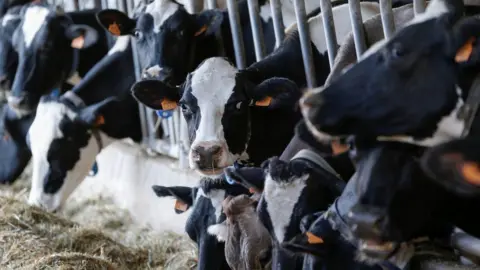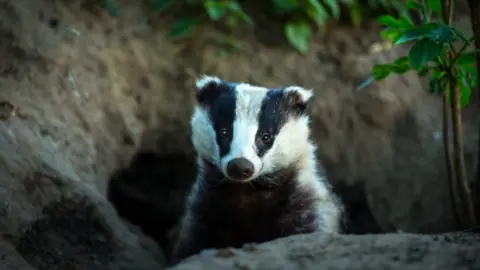Badger culling proposed in west of England to combat bovine TB
 Reuters
ReutersThe government has proposed its next phase of eradicating bovine tuberculosis (bTB).
There are high levels of infection in cattle in much of the west of England, according to the Department for Environment Food and Rural Affairs.
A five-week consultation has been launched to seek views on the targeted culling of badgers as well as the increased use of vaccination.
The Environment Secretary said culling badgers had "proved highly effective."
Tens of thousands of cattle are culled in England every year due to bTB.
According to the latest statistics, bTB infections in cattle decreased by 66% in Gloucestershire and 37% in Somerset after four years of widespread badger culling.
Both counties were the first to have cull zones introduced in 2013.
 Getty Images
Getty ImagesIf the plans are approved, culling would continue in targeted areas until the spread of the disease improves further, following an annual review by Christine Middlemiss, the UK's chief veterinary officer.
Badger vaccination would also be used to maintain the spread.
'No easy answers'
Environment Secretary Steve Barclay said: "There are no easy answers in the battle against TB, but badger culling has proved highly effective and needs to remain a key part of our approach.
"Our strategy has led to a significant reduction in this insidious disease, which we will continue to cull in areas where the evidence confirms it is required, as well as making use of vaccinations."
Ms Middlemiss said: "Our strategy to eradicate bovine TB in England is turning the tide on this disease with the lowest number of new bTB breakdowns in nearly 20 years.
"We are making good progress to eradicating the disease by 2038 as we have committed to do.
"The proposals set out today will ensure this downward trend continues, and all culling decisions taken under the new targeted approach will continue to be led by the very best scientific and epidemiological evidence."
The consultation will close on 22 April.

Follow BBC Somerset on Facebook and, X. Send your story ideas to us on email or via WhatsApp on 0800 313 4630.
